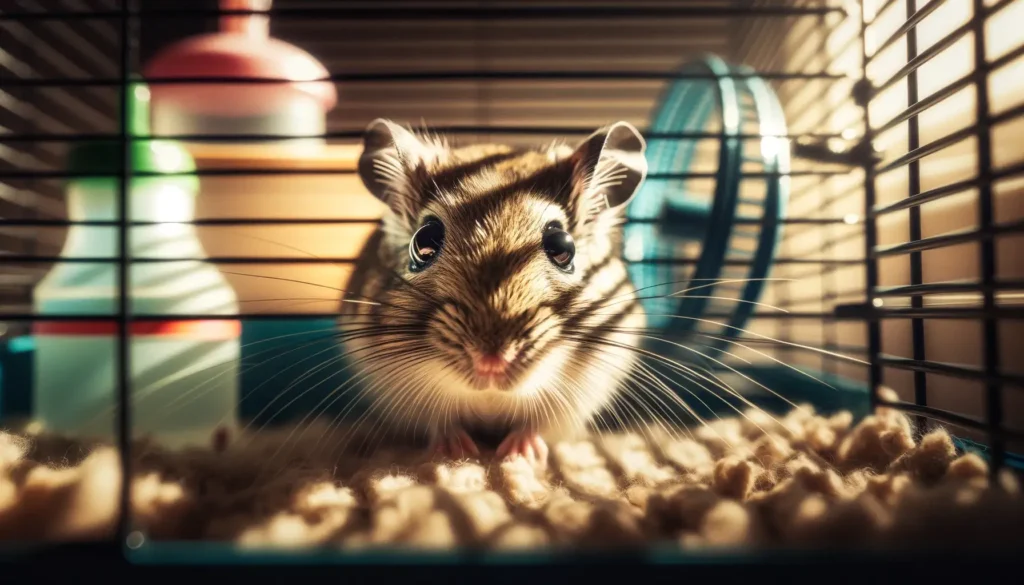Gerbils, with their curious eyes and swift movements, are captivating pets that can form deep bonds with their owners. However, it’s not uncommon for these small creatures to exhibit signs of fear.
Understanding the “Why Is My Gerbil Scared of Me?” question involves exploring their natural behaviors, environmental adjustments, and the right approach to handling.
This article delves into the heart of building trust and ensuring a happy, fearless gerbil companion.
Signs Your Gerbil Might Be Scared
Gerbils communicate their feelings through their behavior, and certain actions might indicate they’re feeling scared. If your gerbil shakes, crouches, or tries to hide when you approach, it’s likely feeling threatened or fearful.
Other signs include avoiding interaction, thumping their feet, or even biting if they feel cornered. Understanding these behaviors is crucial in addressing your gerbil’s fears and helping it feel more secure.
Common Reasons: Why Is My Gerbil Scared of Me?

Several factors can contribute to your gerbil’s fear, ranging from their natural instincts to their experiences with their environment and handlers.
- Size Difference and Perception: To a tiny gerbil, humans can seem like giants. This size difference can be intimidating, making your gerbil feel vulnerable. Approach your gerbil gently and avoid looming over it to minimize this fear.
- New Environment Adjustment: Like many animals, gerbils need time to adjust to new surroundings. Moving to a new home can be stressful, and your gerbil may need a few days to become comfortable in its new environment.
- Handling Frequency: Both excessive handling and not enough interaction can lead to fearfulness. Gerbils need a balanced amount of gentle handling to become accustomed to human contact without feeling overwhelmed.
- Incorrect Handling Techniques: Picking up a gerbil improperly can cause discomfort or fear. Learning the correct way to handle your gerbil is essential for building trust.
- Loud Noises and Quick Movements: Gerbils are sensitive to loud sounds and sudden movements, which can startle them. Keeping the environment around your gerbil calm and predictable helps reduce stress.
- Past Trauma or Negative Experiences: If your gerbil has had negative experiences with humans or other animals in the past, it may take longer to trust and feel comfortable with you.
Building Trust with Your Gerbil
Building trust with your gerbil starts from the moment you bring them home. These initial steps are crucial in laying the foundation for a trusting relationship.
Initial Steps to Gain Trust
- Give Your Gerbil Time to Adjust: Your new gerbil needs time to explore and get comfortable in its new environment. Resist the urge to immediately start handling them. Instead, give them a few hours to a few days to settle in, depending on their behavior and comfort level.
- Wash Your Hands: Before interacting with your gerbil, always wash your hands. This helps your gerbil become familiar with your unique scent, not the smell of your last meal or the soap you used. Consistency in scent is key to building recognition and trust.
- Let Your Gerbil Explore Your Hand and Arm: Place a clean hand inside the cage, allowing your gerbil to approach and explore at their own pace. If they nibble, try not to pull away suddenly. Instead, gently blow on them or softly say “no” to discourage the behavior. This exploration phase is critical for your gerbil to learn that you’re not a threat.
- Give Your Gerbil Treats: Treats are a powerful tool in gaining your gerbil’s trust. Offer treats when they climb onto your hand to create positive associations with your presence. Use healthy treats like sunflower seeds or small pieces of vegetables sparingly to avoid health issues like obesity.
- Interact with Your Gerbil Every Day: Consistent, daily interaction helps reinforce trust. Even if your gerbil is shy or skittish, regular gentle contact will teach them that you’re a safe and positive part of their world.
Effective Handling Techniques
Proper handling is essential for maintaining and deepening the trust you’ve built with your gerbil.
- Gerbil-proof the Room: Before handling your gerbil outside their cage, ensure the room is safe and escape-proof. Cover any gaps where a gerbil might hide and remove dangerous objects.
- Remain Calm: Gerbils are sensitive to your emotions. If you’re nervous, they can sense it. Approach your gerbil with calm and steady hands to make the experience less stressful for both of you.
- Coax Your Gerbil into a Corner: To pick up your gerbil, gently guide them into a corner of their cage and scoop them up from underneath. This method is less intimidating and mimics a natural, secure feeling for your gerbil.
- Pick Up Your Gerbil Gently: Lift your gerbil only a short distance off the ground at first, gradually increasing the height as they become more comfortable. Always support their body fully to prevent injury.
Creating a Safe and Comfortable Environment
A comfortable environment is vital for your gerbil’s well-being and trust in you.
- Provide a Stimulating Cage Environment: Ensure your gerbil’s cage has plenty of enrichment, such as tunnels, chew toys, and a wheel for exercise. A happy gerbil is more likely to be a trusting gerbil.
- Reduce Stressors: Identify and minimize potential stressors in your gerbil’s environment. This includes loud noises, sudden movements, and the presence of other pets that may intimidate your gerbil.
- Routine is Comforting: Establish a routine for feeding, playtime, and interaction. Gerbils thrive on predictability, which can significantly reduce anxiety and build trust.
By following these guidelines, you’ll not only enhance your gerbil’s quality of life but also foster a deep, trusting bond between you and your pet.
Remember, trust-building is a gradual process that requires time and patience, but the reward of a happy, confident gerbil is well worth the effort.
Also read: How to Keep Gerbils Quiet at Night?
Advanced Tips and Common Mistakes in Gerbil Care

After establishing a foundation of trust with your gerbil, you can explore advanced bonding activities and learn to avoid common mistakes that might hinder your relationship.
Advanced Bonding Activities
Enhancing your bond with your gerbil involves more than just handling; it includes engaging in activities that stimulate their natural behaviors and instincts.
- Interactive Games: Gerbils enjoy interactive play that mimics their natural foraging and exploring behaviors. Hide treats around their play area to encourage foraging, or create obstacle courses that challenge them physically and mentally. These activities not only strengthen your bond but also provide essential mental stimulation for your gerbil.
- Routine Bonding Time: Establishing a routine for playtime and interaction helps your gerbil feel secure and look forward to time spent with you. Whether it’s a specific time of day for handling or play, consistency is key to deepening your bond.
- Talk and Listen: Spend time talking to your gerbil in a soft, soothing voice. Gerbils can become familiar with your voice and may even respond to their names. Listening to their sounds and learning to interpret their meaning can also enhance your connection.
What Not to Do: Common Mistakes in Handling Gerbils
Avoiding certain actions can prevent stress and fear in your gerbil, ensuring a positive and trusting relationship.
- Never Pick Up a Gerbil by Its Tail: Gerbils have fragile tails that can be easily injured. Picking them up by the tail can cause the skin to slip off, a condition known as “tail slip,” which is extremely painful and may require veterinary care. Always scoop your gerbil gently from underneath.
- Avoid Sudden Movements and Loud Noises: Gerbils are sensitive to abrupt changes in their environment. Move slowly and speak softly around your gerbil to avoid startling them. Creating a calm, quiet space for your gerbil will make them feel more secure and less likely to be scared.
- Do Not Punish Your Gerbil: If your gerbil nibbles or behaves in a way you don’t like, never respond with punishment. Gerbils do not understand punishment and will only become fearful of you. Instead, redirect unwanted behavior gently and patiently.
- Refrain from Overhandling: While regular interaction is important, too much handling can be stressful for gerbils. Pay attention to your gerbil’s body language and give them space when they seem overwhelmed or tired.
- Avoid Stressful Situations: Introducing your gerbil to new environments or pets too quickly can cause stress. Gradually acclimate your gerbil to new situations, and always supervise interactions with other pets to ensure their safety.
Also read: What is Declanning in Gerbils?
FAQs
How long does it take for a gerbil to trust me?
The time it takes for a gerbil to trust you can vary widely depending on their individual personality and past experiences. Typically, it can take anywhere from a few days to many weeks. Patience and consistent, gentle interaction are key. Providing treats, speaking softly, and allowing your gerbil to explore you at their own pace can help speed up the process.
My gerbil bites me when I try to pick it up. What should I do?
Gerbil bites can be a sign of fear or discomfort. Ensure you’re picking up your gerbil correctly, by scooping them up gently from below rather than grabbing from above. Try to build more trust through daily, calm interactions and treats. If the biting continues, reassess your approach to ensure you’re not unintentionally causing stress.
Can gerbils recognize their owners?
Yes, gerbils can recognize their owners through scent, voice, and appearance over time. Regular, positive interactions help reinforce this recognition, leading to a stronger bond between you and your gerbil.
Why does my gerbil thump its feet?
Thumping is a natural behavior gerbils use to communicate. It can indicate excitement, stress, or a warning to other gerbils. If your gerbil thumps its feet frequently, try to identify any potential stressors in their environment and address them.
How can I tell if my gerbil is happy?
A happy gerbil is active, curious, and engages in regular eating, grooming, and exploring behaviors. Signs of happiness also include coming to greet you when you approach their cage and accepting treats from your hand. Regular, positive interactions and a stimulating environment contribute to your gerbil’s overall happiness.
Conclusion
In conclusion, understanding and addressing the reasons behind your gerbil’s fear is key to building a strong, trusting relationship. By recognizing the signs of fear, implementing gentle handling techniques, and avoiding common mistakes, you can create a safe and comfortable environment for your gerbil.
Remember, patience and consistency are your greatest tools in this journey. Every interaction is an opportunity to strengthen your bond, and with time, your gerbil will learn to see you not as a source of fear, but as a beloved companion. Embrace the process, and enjoy the rewarding experience of earning your gerbil’s trust.











